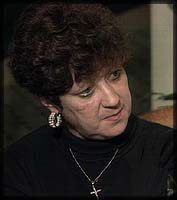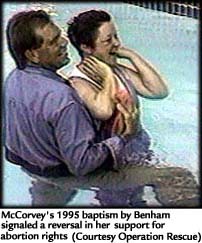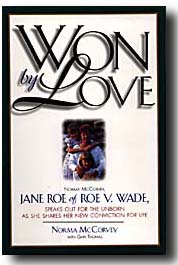Who is 'Jane Roe'?
Anonymous no more, Norma McCorvey no longer supports abortion rights
From CNN Interactive Writer Douglas S. Wood

(CNN) -- Norma McCorvey won't be celebrating the 25th anniversary of the historic Roe vs. Wade decision that legalized abortion.
McCorvey is "Jane Roe," the pseudonym she assumed to remain anonymous as the lead plaintiff in the case that legalized abortion in the United States.
"I'm very sad (about the anniversary)," she told CNN Interactive in a telephone interview. "But this year, I've got so much to do, I don't have time to sit down and be sad."
Once an abortion-rights supporter, the 50-year-old McCorvey has switched sides: She's now a vocal anti-abortion activist. She has started a ministry called Roe No More to fight against abortion rights with the aim of creating a mobile counseling center for pregnant women in Dallas.

'I am Roe'
She began her association with one of the United States' most contentious and volatile sociopolitical issues in 1970, when she became the lead plaintiff in the class-action lawsuit filed to challenge the strict anti-abortion laws in Texas.
The case was appealed to the Supreme Court, which handed down its controversial ruling on January 22, 1973. The decision legalized the right to an abortion in all 50 states and sparked a political debate that remains charged to this day.
However, McCorvey, who was 21 when the case was filed and was on her third pregnancy, never had an abortion and gave birth to a girl, who was given up for adoption.
McCorvey went public with her identity in the 1980s and wrote a book about her life titled "I Am Roe: My Life, Roe v. Wade, and Freedom of Choice."
In the book, McCorvey, a ninth-grade dropout, describes a tough life, explaining that she suffered physical and emotional abuse as a child, spent some time in reform school in Gainesville, Texas, and was raped as a teen-ager. She was later beaten by a husband whom she married at age 16. She also tells of her alcohol and drug abuse, and experiences with lovers of both sexes.
Her first child, Melissa, was raised by her mother; her second child was raised by the father, and the couple agreed that McCorvey would never contact her.
She drifted through a series of dead-end jobs, including work as a bartender and a carnival barker. Once she went public with her story, she worked in several clinics where abortions were performed and did some public speaking, garnering publicity and a little bit of celebrity.
But in 1995, it all changed.
Crossing the line

McCorvey was working at a Dallas women's clinic when the anti-abortion group Operation Rescue moved its offices next door. Initially, McCorvey hurled insults at the protesters.
The Rev. Phillip Benham, Operation Rescue's national director, described her as being "super hard-core" in her support of abortion rights. "She couldn't stand us. She hated us."
But then she and Benham struck up a relationship across the protest lines, when she would go outside to smoke, a habit she still has.
"They couldn't understand this strange relationship with the head of Operation Rescue and the poster child of the pro-abortion movement," Benham said.
Benham, an evangelical preacher, began discussing Christianity with McCorvey. She became friendly with some of Operation Rescue's office staff, and then she accepted an invitation from the daughter of the group's office manager to attend church. That night, she converted to Christianity.
She was baptized by Benham on August 8, 1995, in a swimming pool at a Dallas home. The baptism was filmed for national television.
Anti-abortion activists immediately heralded her conversion.
"She's like Harriet Beecher Stowe, who wrote that book about slavery," Benham said, referring to the author of "Uncle Tom's Cabin."
End result the same

McCorvey publicly committed her life to "serving the Lord and helping women save babies." She took a job at Operation Rescue as a computer operator and was welcomed into the anti- abortion fold.
In a 1997 CNN interview, McCorvey blamed violence at women's clinics on the abortion-rights camp.
"I personally think it's the pro-abortion people who are doing this to collect on their insurance, so they can go out and build bigger and better killing centers," she said.
A book McCorvey co-wrote about her religious conversion titled "Won By Love" was published January 8. "I think everyone should sit down and write a book," she said. "It's a lot like therapy but a lot less expensive."
Abortion-rights advocates were not so happy about the change of heart by the woman who symbolized a woman's right to have an abortion.
Sarah Weddington, the attorney who along with Linda Coffee represented the plaintiffs, now says she would have picked a different plaintiff, who might have better represented the case.
Coffee said she and Weddington met McCorvey via another attorney who specialized in adoptions. Coffee doesn't remember McCorvey having any hesitancy about wanting an abortion.
"She didn't appear to be equivocal," she said. "At the time, she preferred a safe and legal abortion."
Weddington says it is the result that matters because the class-action case affected millions of women. McCorvey's conversion was a "PR plus" for the anti-abortion camp.
"Frankly, no one ever said, 'I believe what Norma McCorvey said, or I believe what Sarah Weddington said,'" the lawyer explained. People, she said, make up their own minds about abortion.
Asked why she thought McCorvey changed her mind, Weddington said, "She's the only one who can answer that," then refused to comment further about McCorvey.
But McCorvey says that attitude validates her belief that abortion is wrong. "If they don't care about me, how can they possibly care about anyone else?" she said.
'Norma's conversion gave us hope'

McCorvey has criticized Weddington in the past for not helping her get an abortion, because the case needed a pregnant plaintiff. "I had to be pregnant," she said.
McCorvey had made one trip to an illegal abortion clinic in Dallas that had been shut down. But now, McCorvey says she wouldn't have had an abortion, anyway, because she was too far along in her pregnancy. "I can honestly say no, I wouldn't have," she said.
When McCorvey announced her change of heart on the issue, Kate Michelman, president of the National Abortion and Reproductive Rights Action League, said in a statement: The Roe vs. Wade decision "isn't about any single individual. It is about the freedom of all women to make reproductive decisions free from government intrusion."
Michelman, through a spokesman, declined to be interviewed for this story.
Coffee said she last saw McCorvey when the television movie about the case was made in the late 1980s.
"Perhaps she may have felt left out by some of the pro-choice groups in connection with the ongoing debate," she said.
That is exactly what McCorvey says about the pro-choice leaders. "They could have been nice to me instead of treating me like an idiot," she said. She said she now prays for pro-choice leaders.
"I don't hate them any more like I used to," she said. "I just don't like them very much."
McCorvey also has faced charges that the anti-abortion movement is using her to further its cause. But now with her own ministry, McCorvey has a quick answer to that accusation.
"How can I use myself?" she asked.
Advocates of banning abortion point to McCorvey as a symbol of hope.
"Norma's conversion gave us hope that the pro-life movement can and will be successful," said the Rev. Robert Schenck, general secretary of the National Clergy Council, a multidenominational group of conservative ministers.
But no matter what either side says, 25 years after Roe vs. Wade, Americans remain divided over the issue of abortion. Norma McCorvey may have changed her mind, but the political debate over abortion continues. © 1998 Cable News Network, Inc.